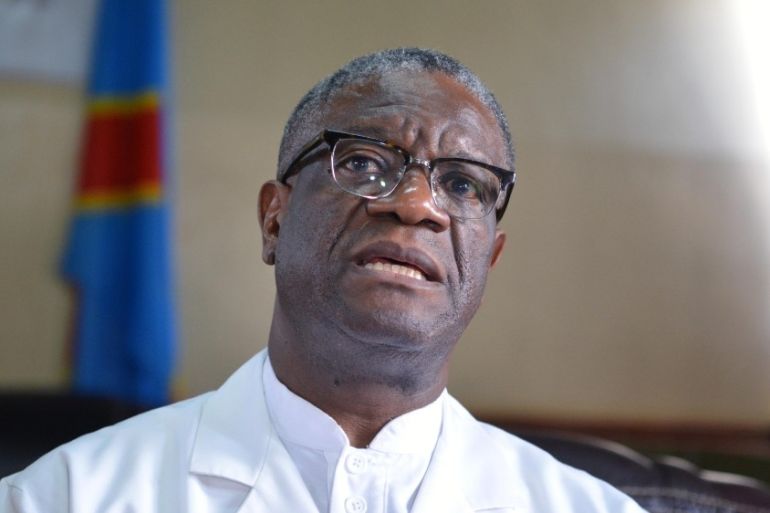DRC rallies in support of threatened Nobel laureate Denis Mukwege
Intimidation attempts believed to be linked to doctor’s outspoken criticism of armed groups’ violence and rights abuses.

Protesters are expected to take to the streets of the Democratic Republic of the Congo’s (DRC) capital to express support for Denis Mukwege, a Nobel laureate who says he has received death threats.
Friday’s rally in Kinshasa is expected to take place a day after hundreds of people attended a similar rally in Bukavu, the capital of eastern South Kivu province, to call for the prominent doctor’s protection.
Mukwege, the founder of Panzi Hospital in Bukavu, was co-recipient of the 2018 Novel Prize for Peace, recognised for his efforts to help war rape victims and “end the use of sexual violence as a weapon of war and armed conflict” in eastern DRC.
A fervent critic of serious rights violations, he has frequently been threatened by armed groups for his calls to bring perpetrators to justice. In 2012, he survived an assassination attempt.
Last month, Physicians for Human Rights (PHR), a partner organisation of Panzi Hospital, said Mukwege and his family had been targeted on social media and received death threats on his cellphone.
“The intimidation efforts appear to be in response to Dr Mukwege’s condemnation of a wave of recent killings by local armed groups in the South Kivu and Ituri provinces,” PHR said, and in reaction to his “consistent appeals for the implementation of the longstanding recommendations of a UN Mapping Report on the most serious violations of human rights in the DRC between 1993 and 2003.
“These include investigations and prosecutions for atrocities that took the lives of millions of people in the region and have included the mass sexual violence that caused thousands of women and girls to seek and receive treatment from Dr Mukwege and his colleagues at Panzi Hospital.”
Released in 2010, the UN report chronicles the involvement of several armed Congolese groups in grave human rights violations as well as operations by the forces of eight other countries.
Carbone Beni, network coordinator of the Filimbi youth movement in Kinshasa, said the protesters on Friday demanded an investigation into the efforts to intimidate Mukwege.
“As citizens, we do not want the massacres to continue any longer in the east of our country. And for that, each neighbouring country should recognise its role and make a commitment to stop this,” he said. “The Congolese want to live with dignity as a human being,” added Beni.
“We will continue to raise awareness and mobilise. It should be a matter of death or life, our dignity.”
|
|
Last week, the United Nations denounced the recent surge of threats against Mukwege, saying they were likely connected with the doctor’s condemnation of rights abuses linked to longstanding violence in South Kivu, characterised by the involvement of “both local and foreign” armed groups.
Meanwhile, the DRC’s President Felix Tshisekedi has promised that the interior, security and justice ministers and others will “take all measures necessary” to protect Mukwege while the UN’s peacekeeping force in eastern DRC (MONUSCO) has also vowed its support.
“We are working together on sustainable solutions that will enable Dr Mukwege and the hospital to be protected by the Congolese institutions, by Congo, and obviously the mission, as a partner, will play its part,” MONUSCO chief Leila Zerrougui said on Wednesday.
The DRC’s conflicts in the late 1990s and early 2000s, dubbed by some “Africa’s world war”, drew in several regional countries seeking to take advantage of the chaos to plunder the resources of the vast nations.
The wars killed some five million people due to fighting, disease and malnutrition and the aftermath is still felt today, with many eastern areas plagued by violence as dozens of rebel groups continue to operate there.